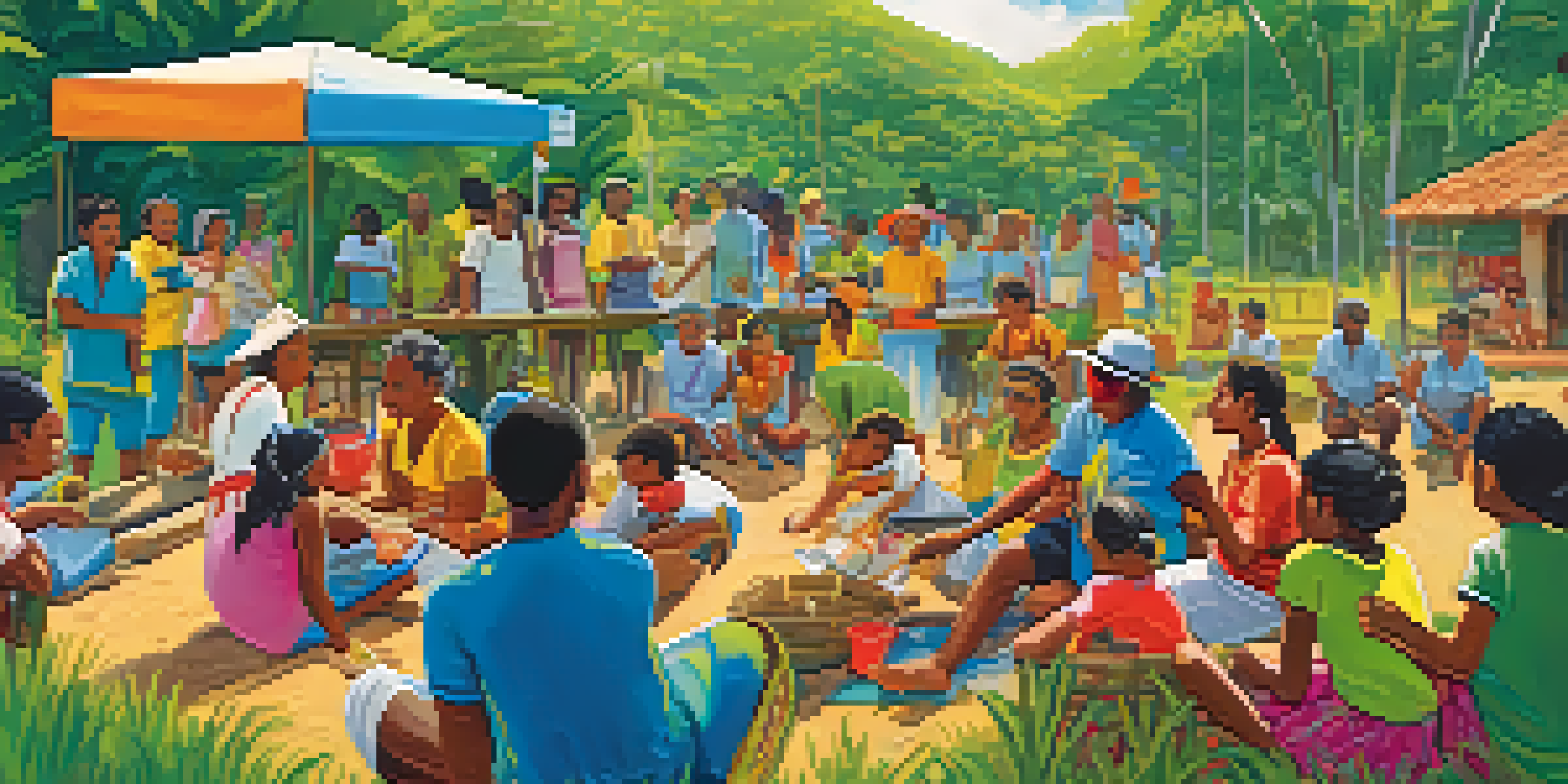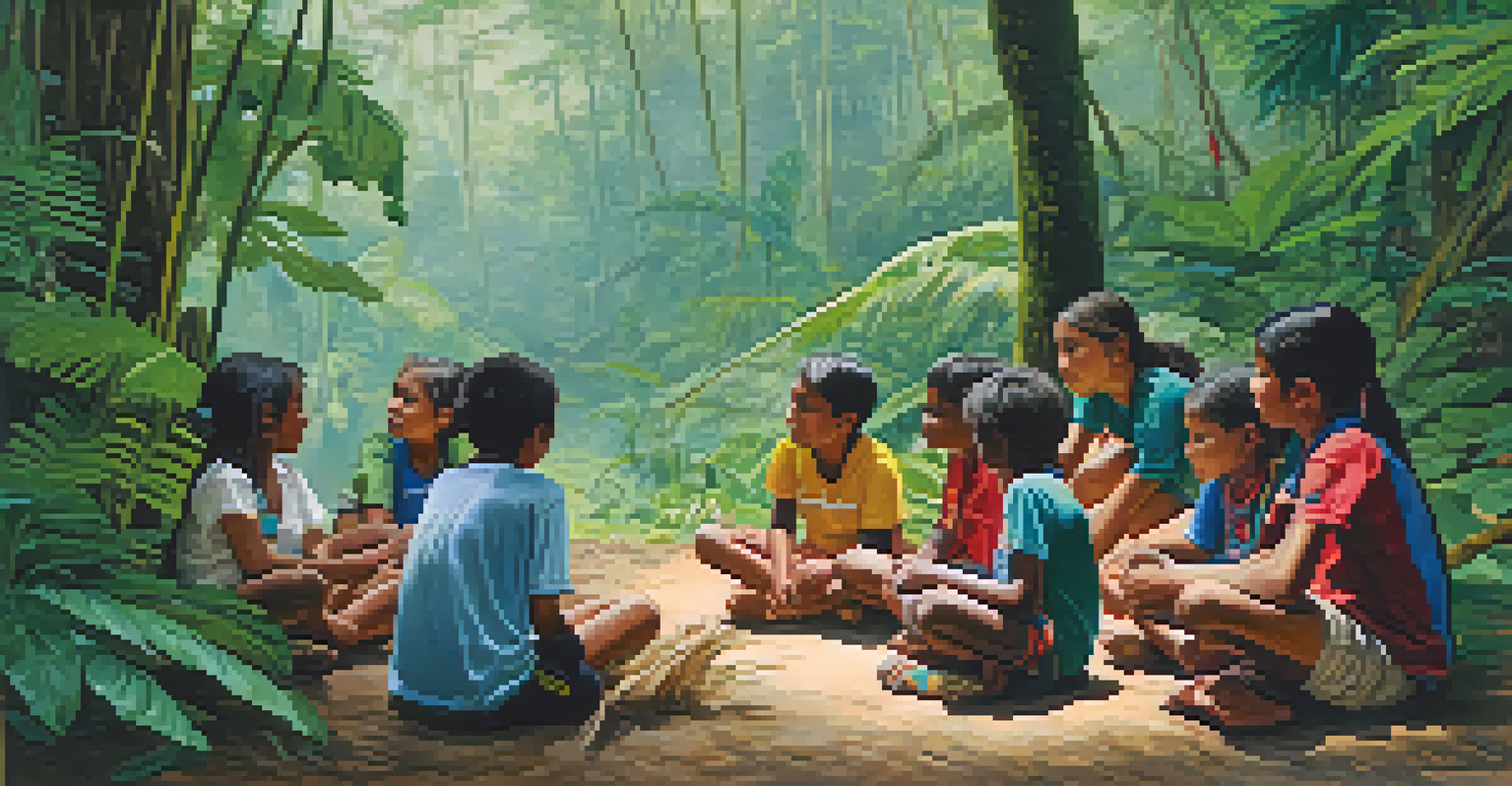Health and Wellness: Volunteer Programs in Brazil

Understanding Health and Wellness in Brazil
Health and wellness in Brazil encompass a broad range of issues, from access to healthcare to mental well-being. The country faces challenges like inequality in health services, especially in rural areas. Understanding these issues is crucial for anyone looking to volunteer and make a difference.
The best way to find yourself is to lose yourself in the service of others.
Brazil's diverse population means that health needs vary widely from one region to another. For instance, urban areas might focus more on mental health support, while rural regions might need assistance with basic healthcare access. This diversity creates a rich tapestry of opportunities for volunteers.
Volunteers can play a vital role in bridging these gaps, providing essential services and support. By engaging in local programs, volunteers not only help communities but also gain valuable insights into Brazil's unique health landscape.
Benefits of Volunteering in Health and Wellness
Volunteering in health and wellness programs offers numerous benefits, both for the community and the volunteer. For the community, volunteers bring additional resources and expertise, helping to improve health outcomes. This can lead to a significant impact on overall community well-being.

For volunteers, the experience is not just about giving back; it's also a journey of personal growth. Engaging with different cultures and health practices enriches one's understanding of global health issues. It fosters empathy and broadens perspectives, making volunteers more effective in their future endeavors.
Volunteering Bridges Health Gaps
Volunteers play a crucial role in addressing health disparities in Brazil by providing essential services and support to diverse communities.
Additionally, volunteering can enhance professional skills and network opportunities. Whether you’re a healthcare professional or a student, these experiences can be invaluable in your career, providing real-world applications of knowledge and skills learned in the classroom.
Popular Volunteer Programs in Brazil
Brazil is home to a variety of impactful volunteer programs that focus on health and wellness. Organizations like Projeto Saúde e Alegria work in the Amazon to improve health services for indigenous communities. Their work often involves health education and direct medical assistance.
Volunteering is at the very core of being a human. No one has made it through life without someone else’s help.
Another notable program is the 'Volunteers for Health' initiative, which connects international volunteers with local health organizations across Brazil. This program focuses on preventive care and wellness education, empowering communities to take charge of their health.
For those interested in mental health, programs like 'Mind Matters Brazil' offer volunteers the chance to support mental health initiatives in urban areas. These programs often involve workshops and community outreach, helping to destigmatize mental health issues.
How to Get Involved
Getting involved in a health and wellness volunteer program in Brazil is easier than it may seem. Start by researching organizations that align with your interests and skills. Many websites provide listings of volunteer opportunities in various sectors, including health.
It's essential to consider the time commitment and requirements when choosing a program. Some programs may require specific skills or certifications, while others welcome anyone willing to help. Make sure to understand what will be expected of you during your volunteering experience.
Personal Growth Through Service
Engaging in health and wellness volunteer programs not only benefits communities but also fosters personal development and cultural understanding for volunteers.
Once you’ve selected a program, reach out to them directly. Many organizations have application processes that involve interviews or orientation sessions to prepare you for your role. This can also be a great opportunity to ask questions and learn more about the community you'll be serving.
Cultural Considerations for Volunteers
When volunteering in Brazil, it's vital to understand and respect local culture. Brazil is known for its rich traditions and diverse communities, and cultural sensitivity can enhance your volunteer experience. Learning a few key phrases in Portuguese can also go a long way in building rapport.
Being open to different ways of life and health practices will help you adapt and connect with the community. Each region may have unique customs and beliefs regarding health, and understanding these can help you contribute more effectively.
Engaging with local community members can provide valuable insights that shape your approach to volunteering. Remember, it’s about collaboration and mutual learning, rather than imposing outside solutions.
Challenges Faced by Volunteers
While volunteering can be incredibly rewarding, it's not without its challenges. Language barriers can pose a significant hurdle, especially in more remote areas where English is less common. However, many organizations offer language support to help volunteers navigate these challenges.
Cultural differences may also lead to misunderstandings. It's crucial to approach situations with patience and an open mind. Being aware of your own biases can help you engage more effectively with the community and its members.
Cultural Sensitivity is Key
Understanding and respecting local customs enhances the volunteer experience, enabling more effective contributions to health initiatives.
Finally, the emotional toll of working in health and wellness can be heavy. Volunteers may encounter difficult situations that can be hard to process. It's important to have support systems in place, whether through the organization or peer networks, to share experiences and cope with the challenges.
The Impact of Volunteer Work on Health and Wellness
The impact of volunteer work in health and wellness extends beyond immediate assistance; it fosters long-term change within communities. By providing education and resources, volunteers empower locals to maintain and improve their health independently. This ripple effect can lead to sustainable improvements in health outcomes.
Moreover, volunteers often leave behind a legacy of knowledge and skills that continue to benefit the community after they leave. Training local health workers or facilitating workshops can create a lasting impact that transforms health practices.

Ultimately, the collective efforts of volunteers contribute to a healthier Brazil. The passion and dedication of volunteers help address critical health issues, bridging the gap where resources may be lacking and inspiring communities to thrive.